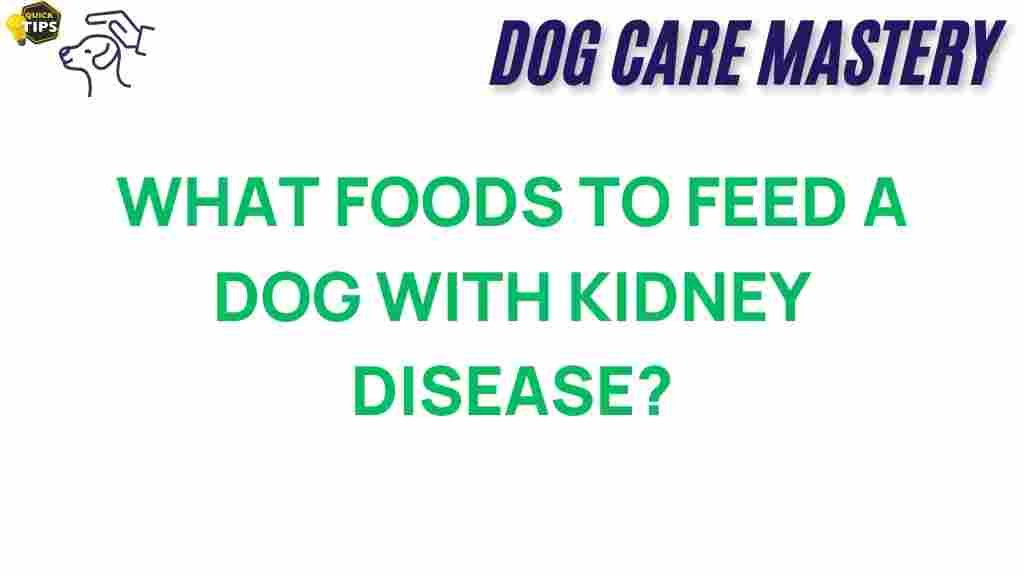Understanding Dog Health: The Best Diet for Dogs with Kidney Disease
Kidney disease in dogs is a serious condition that requires careful management, particularly regarding diet. Feeding a dog with kidney disease is not just about providing food; it’s about ensuring that the food supports their overall health and helps manage their condition. This article unravels the best diet for dogs suffering from kidney disease, focusing on essential nutrients, foods to avoid, and practical tips for pet owners.
Why Diet Matters in Kidney Disease
The kidneys play a crucial role in filtering waste products from the blood, regulating blood pressure, and maintaining hydration. When a dog suffers from kidney disease, its ability to perform these functions diminishes, leading to a buildup of toxins in the body. Diet becomes crucial in managing this condition and can significantly affect a dog’s health, quality of life, and lifespan.
Key Nutritional Considerations
When it comes to dog health, particularly for those with kidney disease, the following nutritional considerations are paramount:
- Protein: Dogs with kidney disease often need a diet low in protein to reduce the workload on their kidneys. However, the protein that is consumed must be of high quality.
- Phosphorus: High levels of phosphorus can worsen kidney disease. A low-phosphorus diet is typically recommended.
- Sodium: Reducing sodium can help manage blood pressure and fluid retention, which is essential for dogs with kidney issues.
- Omega-3 Fatty Acids: These can help reduce inflammation and support kidney function. Fish oil is a good source of omega-3.
- Hydration: Keeping a dog hydrated is crucial. Wet food can be beneficial for increasing water intake.
Foods to Include in a Kidney-Friendly Diet
When selecting food for dogs with kidney disease, consider the following options:
- High-Quality Protein Sources: Look for easily digestible proteins like chicken, turkey, or fish.
- Low-Phosphorus Vegetables: Carrots, green beans, and sweet potatoes can be good additions.
- Rice and Pasta: These can serve as good carbohydrate sources that are easy on the kidneys.
- Canned Pumpkin: This is a great source of fiber and nutrients.
- Specialized Kidney Diets: Veterinary-prescribed diets are available that are specifically formulated for dogs with kidney disease.
Foods to Avoid
To protect your dog’s health, certain foods should be avoided:
- High-Protein Foods: Limit beef, lamb, and other high-protein sources.
- High-Phosphorus Foods: Avoid organ meats, dairy products, and certain fish.
- Salty Snacks: Steer clear of processed foods and treats high in sodium.
- Excessive Fat: Avoid fatty meats and fried foods.
Step-by-Step Process for Transitioning to a Kidney-Friendly Diet
Transitioning your dog to a kidney-friendly diet requires a systematic approach. Follow these steps:
- Consult Your Veterinarian: Before making any changes, discuss your dog’s specific needs with your vet.
- Select Appropriate Food: Choose high-quality dog food designed for kidney health or prepare homemade meals with vet guidance.
- Gradual Transition: Mix the new food with the old food over 7-10 days, gradually increasing the new food’s proportion.
- Monitor Health: Keep an eye on your dog’s response to the new diet; look for improvements or any adverse reactions.
- Regular Vet Check-Ups: Ongoing check-ups will help track your dog’s kidney health and dietary effectiveness.
Tips for Enhancing Your Dog’s Diet
Here are some practical tips to enhance your dog’s kidney-friendly diet:
- Make it Palatable: Add low-sodium broth or mix in a small amount of wet food to make meals more appealing.
- Use Supplements: Omega-3 fatty acids and probiotics may support kidney health, but consult your vet first.
- Monitor Water Intake: Ensure your dog drinks plenty of water to stay hydrated, especially if feeding dry food.
- Maintain a Regular Feeding Schedule: Consistency can help with digestion and appetite.
Troubleshooting Common Issues
As you transition your dog to a kidney-friendly diet, you may encounter some common issues:
- Refusal to Eat: If your dog is reluctant to eat the new food, try adding a small amount of their favorite treat or topping to encourage them.
- Digestive Upset: If your dog experiences diarrhea or vomiting, consult your veterinarian. You may need to adjust the diet further.
- Weight Loss: Monitor your dog’s weight closely. If they lose weight, consult your vet to ensure they’re getting enough nutrition.
Conclusion: Nourishing Your Dog for Health
Feeding a dog with kidney disease is a delicate balance that can significantly impact their health and well-being. By focusing on high-quality, kidney-friendly foods and avoiding harmful ingredients, you can help your dog lead a healthier life. Remember, every dog is unique, and working closely with your veterinarian ensures that your dog receives the best care tailored to their specific needs.
For more information on dog health and nutrition, consider visiting this resource.
Taking control of your dog’s diet is not just about managing a condition; it’s about enhancing their quality of life. Always stay informed about the latest in pet nutrition and care to provide your furry friend with the best possible support.
This article is in the category Nutrition and created by dogcaremastery Team
